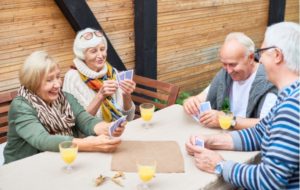As your loved one grows older, it can become more and more difficult for them to lead a fulfilling social life. While this is an expected part of aging and affects almost a third of the senior population, it can be detrimental.
Social isolation can impact your loved ones’ mental health and can also increase their risk of developing physical conditions such as dementia and heart disease. We know this sounds frightening, but you should know that there are easy steps you can take to ensure that your loved one is staying socially healthy.
We’re here to help you understand what social isolation really means and what steps you can take to help your loved ones’ social life thrive.
Why are Older People at Risk?
You may wonder why social isolation and loneliness become more of a concern as someone ages. The risk for loneliness and social isolation increases with age because of factors such as:
- Living alone or far away
- Loss of family or friends
- Chronic illness & disease
Differences Between Social Isolation and Loneliness
Loneliness and social isolation are sometimes used interchangeably, but they are a bit different.
Loneliness is simply the feeling of being alone, no matter how much social contact your loved one has.
Social isolation, on the other hand, is a lack of social connections in general. This can lead to feelings of loneliness, depression, and anxiety in older adults.
Benefits of Socializing for Your Loved One
Having an abundant social life offers many physical, emotional, and mental health benefits for seniors. Some of the benefits of socialization include:
- Improved brain health: Socializing requires older adults to actively participate in conversation and activities. Studies have shown that this type of engagement can improve brain function.
- Reduced stress & blood pressure: Social environments can offer a senior a relaxed, comfortable setting. This can reduce stress, lower blood pressure and reduce the risk of heart attack or stroke.
- Lower risk of developing depression: Seniors who lead active social lives often feel less isolated and lonely. Social isolation and loneliness often lead to depression and other mental health issues.
- A slowed decline in health: Research shows that socialization may help reduce the progression of declining health. This is mainly because older adults who feel socially engaged often make their health more of a priority.

Ways to Help Seniors Avoid Social Isolation
Now that you know why a good social life is a big deal for older adults, we’re here to share the different ways you can encourage socialization in your loved one’s life.
Encourage Visitors to Stop and Stay Awhile
Visits from family and friends are an essential part of everyone’s social life. Unfortunately, as someone ages, it can take more and more effort to plan visits for themselves, and their social life can suffer because of it.
To help your loved one feel less socially isolated, you should visit them often and encourage others to do the same. Even short visits can offer your loved one a way to connect while feeling supported and comforted.
Tap into Technological Resources to Combat Isolation
With advances in technology, connecting with others has never been so easy. We understand that you may not be as close to your loved one as you like, but video calling and other technologies can make it feel as if you’re in the same room as your loved one.
You can encourage friends and family to use these technologies to connect with your loved ones. You can also look into programs such as virtual connections like we have at The Villages that focus on building a community on a virtual platform.
Talk with a Senior Living Advisor
A senior living advisor is an expert in senior social isolation, and they have the resources to help you. A senior living advisor can recommend programs offered in the community and highlight additional support services available to you.
Promote Sense of Purpose
Having a sense of purpose makes someone feel fulfilled and valued. If a senior has lost their sense of purpose, they may feel like they have nothing to give. This can cause them to withdraw socially and feel isolated.
Some of the ways you can instill a sense of purpose in your loved one are to:
- Ask for their help and opinion often
- Encourage them to share with others
- Find environments where they feel belonging
- Encourage them to volunteer their time
Give a Senior a Plant to Take Care Of
Having something to take care of can give your loved one a sense of purpose. Even better, it may also encourage them to learn more about plants, allowing them to meet like-minded people and establish a connection over a shared interest.
Encourage Dining with Others
Eating is about more than just getting a nutritious meal. It can be a great way to introduce structured socialization into your loved ones’ life.
Dining with others gives your loved one the opportunity for socialization & togetherness.
Consider a Senior Living Community
Senior living communities are built on forming meaningful connections. They offer programs, amenities, classes, and more to help seniors find a sense of belonging among a group of like-minded people.
At The Villages, we are passionate about enriching the lives of every person that walks through our doors. If you have any questions about senior socialization, please contact us today! We are more than happy to help,




